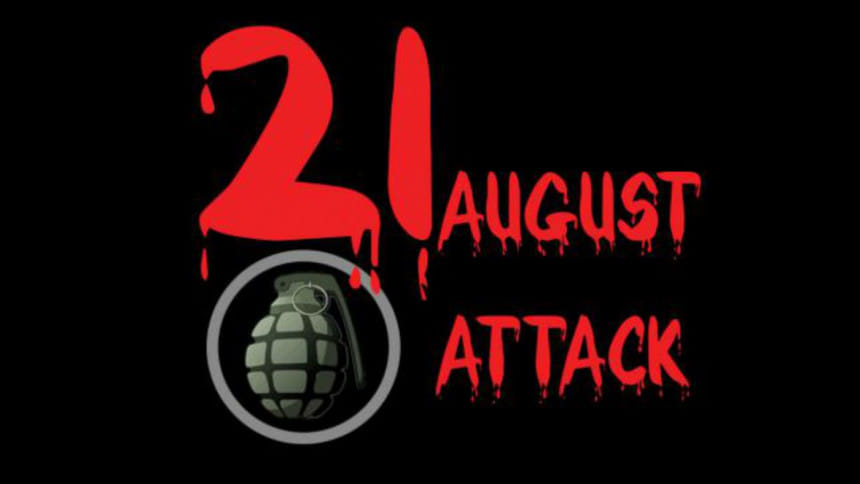A devastating assault on our national security

The August 21, 2004 grenade attack on an Awami League rally, targeting the-then opposition leader Sheikh Hasina and top party leaders, marked possibly the most devastating assault on our national security.
The 2004 mayhem was preceded by another high-profile attack on the-then British High Commissioner Anwar Choudhury (just three months earlier) and followed by the simultaneous bombings in 63 districts by JMB across the country just one year later.
While the-then Prime Minister Khaleda Zia denounced what she called a "dastardly attack," there were clear attempts by her government to obstruct justice. Those assigned to investigate the case destroyed and tampered with evidence and, most ridiculously, produced the "Joj Miah saga"—involving an arranged confession of one Joj Miah that he had been the main perpetrator. Therefore, they could be held liable for serious negligence, obstruction of justice and subversion of the investigation process.
Most discreditable of all, BNP ran a countrywide campaign to refute the obvious—that the attack demonstrated the failure and, to some extent, the complicity of some elements within the administration—and put the blame on the victim. One may recall how countless propaganda posters and placards appeared across the country in the aftermath of the attack, which had killed 24 people and wounded 300, claiming that it was rather the Awami League which had orchestrated the attack on itself to discredit the government's success. The BNP government simply denied the existence of any extremist group in Bangladesh's soil despite the overwhelming evidence to the contrary.
In the current scenario, though the government's mandate to fight militancy is clear, the AL government has rejected the notion that foreign-linked militant groups such as Islamic State may have any presence in the country, a stance that contradicts the terrorist group's claims. Some top government officials have even blamed opposition groups for terrorist attacks. Such political response towards a matter of grave security concern, signifies our inability to grasp its seriousness, which consequently impedes developing a proper strategy to prevent such crippling attacks from repeating, but more importantly, stifles proper investigation and the legal process.
As far as the 2004 attack is concerned, there are many grey areas that need to be cleared despite the fact that the Awami League, which was the target of the attack, has been in power for a decade, and the investigation has progressed in the right direction with the HUJI leader, Mufti Hannan, sentenced to death, and many important players identified.
The precision with which the attack was executed left no one in doubt that it was thoroughly planned with professional expertise. The attackers enjoyed the near-complete freedom of operation and slipped through the security cordon afterwards.
What's more, it required extensive training to operate weapons like the Arges Hand Grenade 84, which are manufactured exclusively for military use mainly in Austria, with such professionalism. No militant organisations, not even HUJI which has been closely linked with Al Qaeda, could act so efficiently without sophisticated external help and training. And then, the mystery of similar grenades found inside the drain of the old central jail the same day has not been resolved yet—even though it is important for us to establish the full story.
Overall, the incident also exposed how unprepared we were to respond to such a situation. Our inability to predict what was coming and recognise that we were vulnerable to the growing appeal and rise of religious militancy—that too despite previous attacks such as Ramna Batamul and Jessore bombings—was staggering.
How much has our anti-terror capability increased since then? After the horrible Holey Artisan Bakery attack in 2016 that took the lives of 22 people including 18 foreigners, the government's vigorous anti-terror response has proved to be fairly successful in curbing the militants' capabilities. The anti-terror law enforcement teams seem to have considerable understanding and knowledge about the terror organisations' strategy and approach. But our counter-radicalisation efforts have yielded little success in terms of countering militant ideological propaganda.
By now, the HUJI is split and on the wane, but the overall threat isn't. For example, as this newspaper has recently reported that Jama'atul Mujahideen Bangladesh (JMB), which had carried out numerous terror attacks including the 2005 series of bombings, is raising funds through robbery and other illicit means. In addition, its actively pursuing, and in many respects succeeding, in its strategy to radicalise criminals in jail.
Over the years, JMB has been synonymous with terror activities in Bangladesh. In fact, the police see all newly emerged militant organisations that have pledged loyalty to international outfits as "neo-JMB."
The organisation had claimed responsibility for the recent killing of Shahjahan Bachchu, an author and publisher, last month. In a recent interview carried by the organisation's own propaganda publication, its current chief Salahuddin has been referred to as the Amir of "Jama'atul Mujahideen," excluding the word, Bangladesh. The organisation reportedly seeks to expand its presence outside the country and transform itself into an international umbrella terror outfit.
The August 21 grenade attack was an attack on our democratic process. It is democracy and freedom that militants find so loathsome. With the election approaching and JMB recouping its strengths, a professional counter-terrorism approach, that also addresses the ideological appeal to militancy, is crucial for the sake of our national security and democracy.
Nazmul Ahasan is a member of the editorial team at The Daily Star.

 For all latest news, follow The Daily Star's Google News channel.
For all latest news, follow The Daily Star's Google News channel. 



Comments